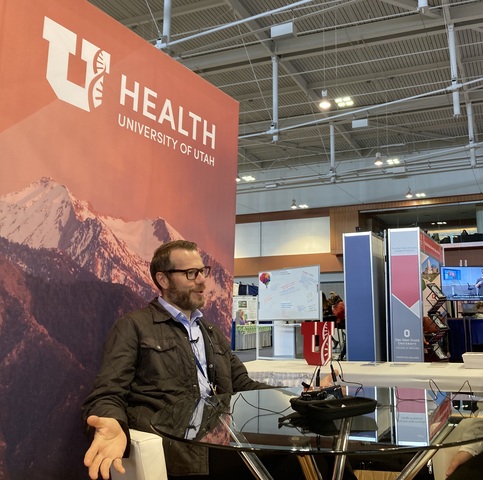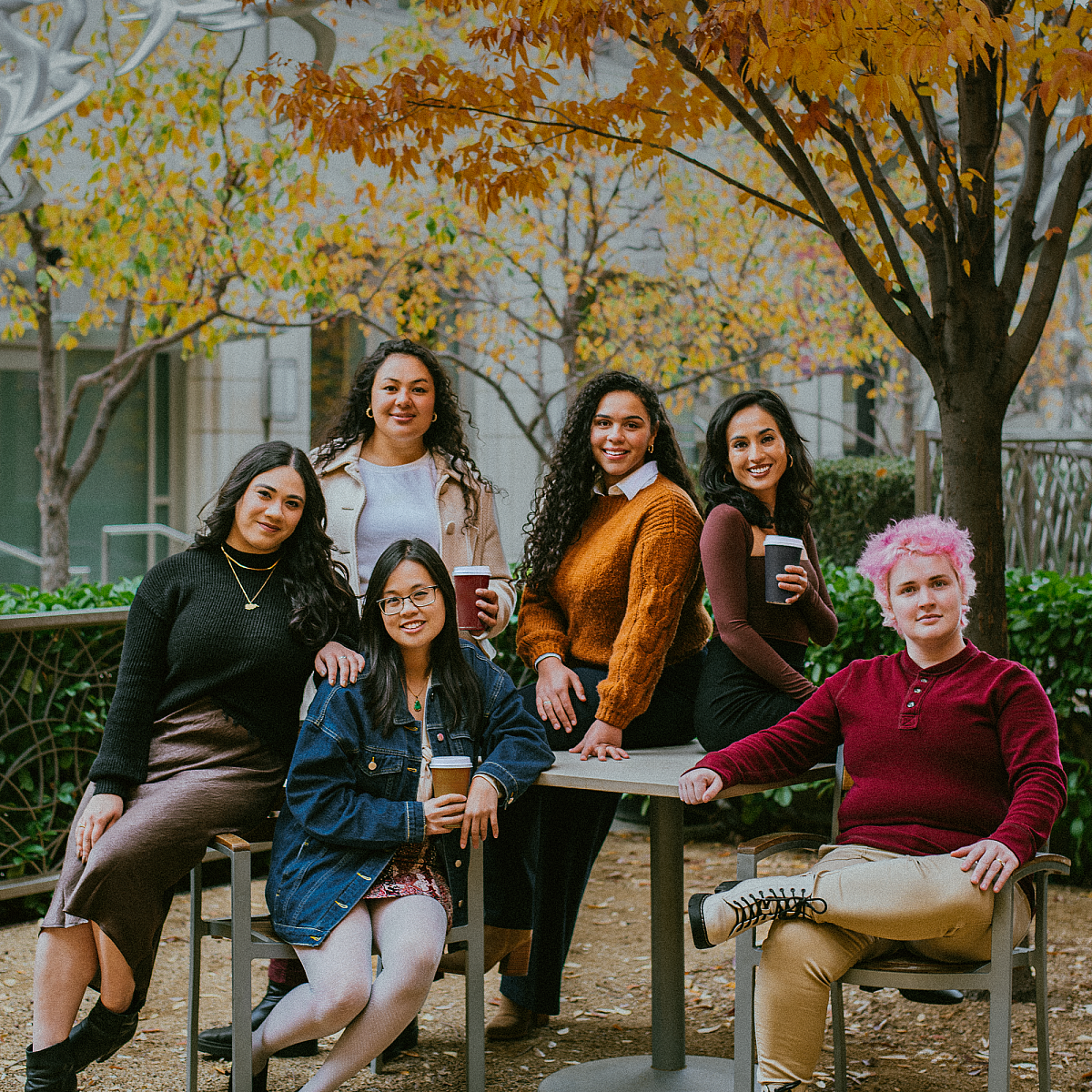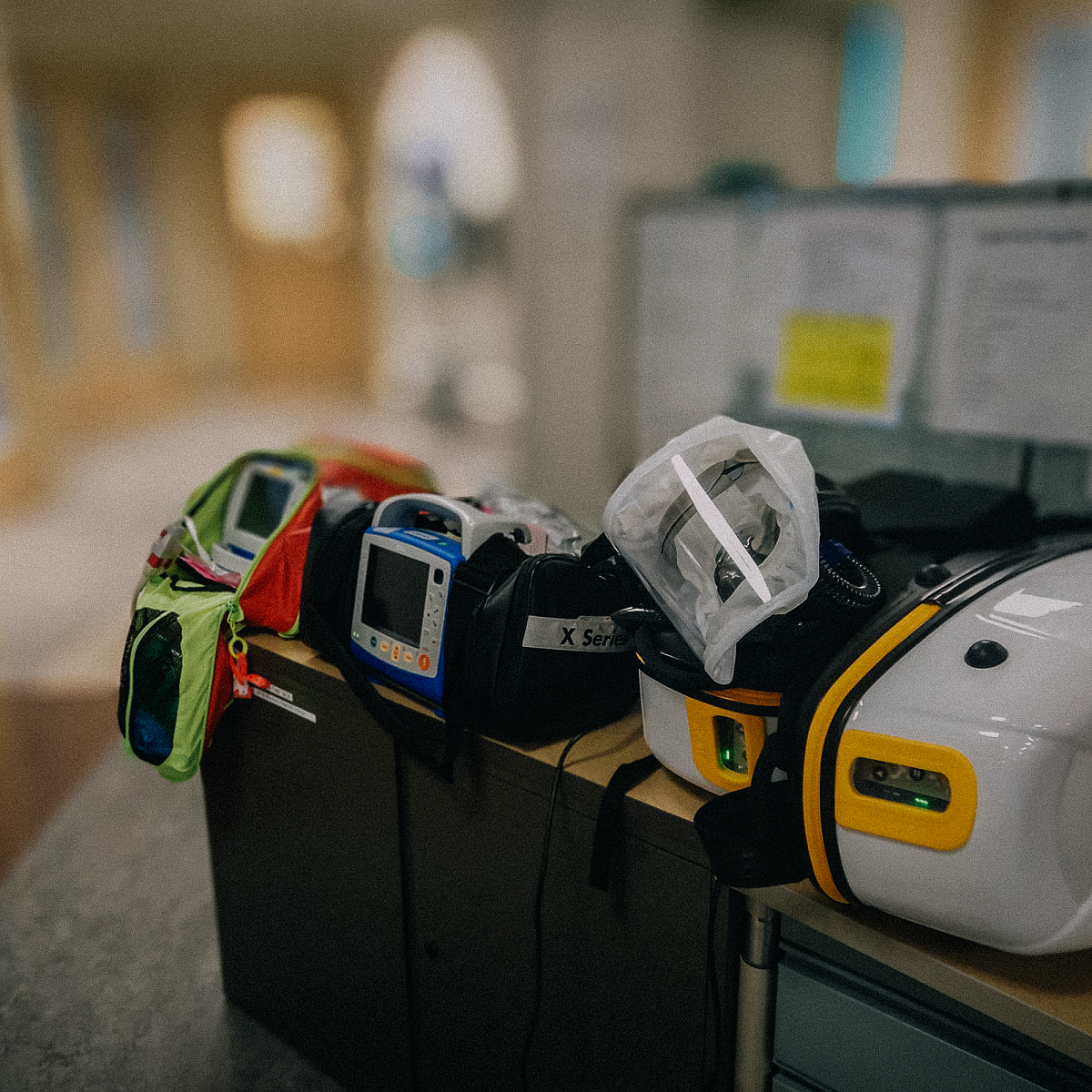
Episode Transcript
Mitch: We are The Scope here at the AAMC Learn Serve Lead 2022 Conference, and we are having conversations about the future of medicine as a whole, how we educate, how we heal, how we treat, and the conversations are from the ground up. What are we doing to kind of completely change some of our approaches, our values? What it means to care and to be a part of medicine.
Today, we are joined by Dr. Adina Kalet. She is the Director of the Robert D. and Patricia E. Kern Institute for Transformation of Medical Education at the Medical College of Wisconsin. And Dr. Tom Hurtado, fellow podcaster from the University of Utah. He runs a great show called "The RealMD." Why don't you tell us a little bit about "The RealMD"?
Dr. Hurtado: "The RealMD" program is a professional identity formation program at Spencer Fox Eccles School of Medicine at the University of Utah. We focus on developing meaning, community, and purpose with our medical students. And we do that through sessions that we have with physicians, a workbook, and we also have a robust coaching program.
Mitch: So, I think what we kind of wanted to just talk about today is what are some of the ways that we can get into the actual core values of medical education and how that in turn changes medicine as a whole, the kind of doctors we can expect, etc.
Dr. Kalet, how are you guys kind of approaching that and trying to solve that?
Dr. Kalet: So, one of the wonderful things about being in the profession of medicine is that we have a foundation in character and caring that's ancient. It goes back to Aristotle, Hippocrates. So, it's not controversial to center character and caring in the training of physicians, but we have drifted . . .
Dr. Hurtado: Oh, I like that word, drifted.
Dr. Kalet: . . . away from that, I think, as the profession became more science-based, more technology-enhanced. And so, now it's a matter of returning to our core values, our core principles while we prepare young people to serve the public's health as physicians.
It's not controversial. It's just challenging. It's hard to do. There's a lot to do. It takes many, many years to make a good physician, to become a physician.
I would love to talk to you about professional identity formation. It's a developmental process. It starts very young and continues through to the end of your career, and it's always evolving and changing.
Dr. Hurtado: This idea of drifting, I guess I'm very intrigued by what you're saying. And it makes perfect sense that these aren't things . . . These fundamental things we're talking about that need to happen in medicine are not new, but we have drifted, we've forgotten. And the word that comes to my mind is, "What are we doing to reawaken these things?" These things we know to be a part of who we are as humans and also as, I think, care providers.
I mean, there are things underneath all of that. People have been caring for people forever, right? So, I guess my question that comes to my mind is, "What are you doing to reawaken people?"
Dr. Kalet: I think part of it is working with medical students very early on, even before they become medical students. People come to us with pure motivations, commitment, and potentially an understanding of what that requires, even as very young people. They just don't have any life experience.
And our goal, I think, is to vaccinate them, to protect them from the loss of their ideals, and what motivates them initially to enter a very, very challenging educational training process that takes a decade at the least. And so, to make that kind of commitment to be the kind of young person who wants to be a physician is a remarkable thing.
You work with medical students. Medical students are among our top 1% of American students.
Dr. Hurtado: Right.
Dr. Kalet: They're academically superstars. They're capable of great things. We just want to keep them connected with the why.
Dr. Hurtado: Yes. I love this conversation so much. The thing in the literature that I've . . . In my work arriving at the point of starting medical school with more feelings of autonomy and then immediately starting to lose those feelings of autonomy, or engaging or not engaging in help-seeking, so becoming help-avoidant, to not want to appear vulnerable in the system, I look at, "Oh, those are just recipes for . . ."
Dr. Kalet: For the loss of ideals.
Dr. Hurtado: For the loss of ideals.
Dr. Kalet: The loss of values. Right.
Dr. Hurtado: Yeah.
Dr. Kalet: And because it's so competitive to get into medical school, we often select them based on their individual ability to perform.
Dr. Hurtado: Yes.
Dr. Kalet: What I say to medical students during orientation to medical school is, "That's what got you here, being a remarkable individual performer, but it's not what we need you to aspire to as a physician. You need to aspire to care for others, to do things in service of others." And that's not an abhorrent thing. We're just changing the rules, and we have to align medical school structure with that.
Dr. Hurtado: Exactly. That's what we talk about in orientation too. We say, "Look, obviously there's a knowledge and skill delivery that needs to happen here. And the body of knowledge that you're expected to remember and regurgitate on demand continues to grow and evolve and change."
Dr. Kalet: Right. And you have to figure out how to do that.
Dr. Hurtado: And you have to figure out how to do that. I get that. But the part where it really connects with me around professional identity development is this idea of keeping your meaning and purpose, and having a learning environment that supports meaning and purpose. And that is, to me, the other half.
I mean, maybe it's too bold to say that, but the other half of that education experience, whatever is happening, the touchstone that you must always come back to is "Why are you here, and who are you? Who are you becoming? And as you start to think, act, and feel like a physician, are you driven and connected to that higher purpose? And are you exploring that?"
I know that's nascent for a lot of them, that's a lot to ask, but it's creating a conversation that you hope as . . . Professional identity formation is this iterative process over time. If you can commit yourself to a process of meaning-making . . .
Dr. Kalet: Right. Well, you just quoted the Cruesses, right?
Dr. Hurtado: I did. I should cite Cruess and Cruess.
Dr. Kalet: Anything by Cruess and Cruess. So, we've worked on a measure of professional identity formation, which is based on essays called "The Professional Identity Essay," where we ask students to answer nine prompts. We do it during orientation in medical school.
And those essays are analyzed for the structure of the language they use to explain to us why they want to be a physician. Basically, what we want them to be able to do is move from a place in their identity formation where they're looking outside of themselves.
Dr. Hurtado: External sources.
Dr. Kalet: Right. For rules and regulations about what it means to be a doctor to the point where they internalize that, and it becomes who they are, and they look inside themselves.
We can measure that. We know by the time they come to us very many of our medical students already have internalized . . . Many of them, not all of them. But over time during medical school, more and more and more of them become more mature. They're more internalized.
So, anything we can do to enhance that process by talking with them, by giving them opportunities to reflect, by giving them opportunities to talk to each other, to challenge each other about the why, the meaning, the reason they're spending so many hours a week learning molecular biology, and why that matters.
And we want them to meet the patients whose lives they're going to impact early in their career so that they understand the context why they're doing what they're doing, the purpose of it, the meaning of it, and to meet role models that embrace the best.
Dr. Hurtado: Positive role models.
Dr. Kalet: The best of what our profession has to offer. To also meet people who have stumbled and fallen. The idea of productive failure is something we talk about a lot, which is if you want to be an expert, which we have no choice as physicians but to strive to be experts, then you're going to have to push yourself until you fail. And you're going to have to learn how to learn from that.
Dr. Hurtado: And that goes against all of their training.
Dr. Kalet: Up until that point.
Dr. Hurtado: Up until that point.
Dr. Kalet: Right.
Dr. Hurtado: And yet in this moment you're saying, "Not only are we going to academically challenge you maybe more than you ever have been in a sustained way, but we're also going to ask you to find productive ways to fail or learn from your failures."
Dr. Kalet: And learn from every moment of that failure. And to do it together in teams with more senior, more junior people so that we're, as a profession, supporting each other. That's a model that is not in the traditional curriculum.
Dr. Hurtado: No, it's not.
Dr. Kalet: But it increasingly is in new versions of what we're doing. And at the AAMC-related medical schools, there are many great examples.
Mitch: And to be as kind of this outsider lay person, we have a show called "Bundle of Hers," and it's all about diverse women in medical school and their experience. One of the most responded to, listened to, the most emails we've ever got was an episode where we interviewed someone who failed out of medical school. And it was just transformative for these people. They were so fascinated to hear, "Oh, failure is okay. Failure is a part of learning."
Dr. Kalet: You survive.
Mitch: And so, just hearing how much people resonate with that idea and the fact that that's one of the key values that you're bringing in, that is going to mean so much to so many people.
Dr. Kalet: And the ancient philosophers had lots to say about that. This is not news, right? I can't quote it, unfortunately, but in the Kern Institute, we have a philosophies lab. We have a Philosophies of Medical Education Transformation lab because we want people thinking deeply about the ancient wisdoms, about the new psychology and cognitive psychology that suggests that in order to do this kind of work, which is so emotionally challenging and so intellectually challenging, to do it at your best possible level for your entire career. I mean, there's no room for error in what we do, and yet errors occur. And so, you have to manage all of that.
So, to prepare young adults for that takes attention to them as individuals. And I agree, I think the failure and survival stories are the most important ones.
Dr. Hurtado: Yeah. In "The RealMD" program, it's an acronym, and the E in "Real" is for excellence. And I think on the surface, people think, "Well, the traditional definition of excellence is obviously just perfection."
Dr. Kalet: Perfection in performance, but it's not.
Mitch: Success, success, success.
Dr. Hurtado: We redefine it. And one of the most popular episodes of "The RealMD Podcast" was from one of our students who was a fantastic student, but tried to match into ophthalmology and didn't the first time.
And what happened in that process after not matching and regrouping and doing a research year, doing a research fellowship, and then coming back to it, in this case was able to succeed, but it took a lot longer. Not the way that was intended.
I think, "What is excellence? Is excellence an outcome or is it a mindset to continue to try . . ."
Dr. Kalet: Of a process. Yeah.
Dr. Hurtado: And commit yourself to a process even when an unexpected failure happens, or multiple failures, or the road . . . Which is never linear. It's expected to be linear.
Mitch: For anyone. Not just medical students, right?
Dr. Kalet: Exactly.
Dr. Hurtado: The road is not linear.
Dr. Kalet: The problem with medical students is they're so special that they . . . Many of them make it to their mid-20s never having faced failure.
Dr. Hurtado: Exactly. And that makes them fragile.
Dr. Hurtado:It does.
Dr. Kalet: And in fact, my favorite medical students are the ones who have faced some very significant challenges and have recovered. They're often much, much more mature.
Dr. Hurtado: Right. The resilience is developed.
Dr. Kalet: It's definitely developed. But if you don't let students stumble with support, then they won't learn that resilience, I don't think. And then the worst thing happens, which is in real patient care situations where things are complicated and chaotic, they don't have all the tools they need.
Dr. Hurtado: So, what sorts of interventions are you doing to awaken this?
Dr. Kalet: So, we're reforming our curriculum at the Medical College of Wisconsin to move from almost an entirely lecture-based, or largely lecture-based, curriculum to one where students have to discuss cases with their peers and faculty as the major educational activity.
They have to learn on their own, they have to identify their own learning needs, and they have to meet their own learning needs. They get assessed frequently, but not at high stakes so that they get to monitor and be accountable for what they're learning and what they know.
They have to demonstrate that they can perform the skills of doctoring early, so in standardized patient exams, in all kinds of simulations. It's not only about knowing, but it's also about being able to do and implement.
We ask them to write a lot more than I ever did as a medical student. To write stories, write about themselves, to reflect with specificity on their own strengths and weaknesses.
Those are the sort of fundamentals. That's a difficult curriculum to design well, to implement well. It requires a lot of faculty support, faculty development. But fundamentally, we want to put the responsibility for learning in the hands of the learners.
Dr. Hurtado: Yeah. Self-directed.
Dr. Kalet: Right. And not infantilize them by lecturing at them and then testing them, which I think we did for way too long, and we need to stop doing.
Dr. Hurtado: Yeah. How did this awaken in you? I mean, we know how training was. We're still struggling to break free from. When did this happen for you? What was your aha moment for professional identity formation being something you were going to dedicate yourself to?
Dr. Kalet: How far back can I go?
Dr. Hurtado: Well, you're going to have to go back a little bit if I'm asking this kind of a question.
Dr. Kalet: So, I can tell you this. I grew up in a family of refugees and immigrants, who lived through some really hard things and they had illnesses as a consequence. And so, I was surrounded by people who really needed the kind of health care that they deserved, the kind of health care I hope my students and residents deliver, but they didn't get it.
And so, I was motivated early to try to understand what it means to be a physician in that situation. I had traditional education, but I had a handful of mentors along the way who didn't let me off the hook.
Dr. Hurtado: Yeah, and a positive role model challenges you too. It's not just someone that's bright and rosy all the time. It's someone who is invested in you.
Dr. Kalet: Right. Invested in you and understands it's about who you are as a person.
Dr. Hurtado: And has a growth mindset about you, about where you're going, and wants to challenge you to get there.
Dr. Kalet: Right. And so, I had motivation, and I had a handful of teachers who believed in me.
Dr. Hurtado: That's awesome.
Dr. Kalet: A small handful, but . . .
Dr. Hurtado: That's all it takes.
Dr. Kalet: Yeah. That was early on. And then my medical education, I had some innovative educators in there. Not most of them, but some. And then I wanted to make sure the future was better than what I had experienced in medical school. Can I tell you a story about remediation?
Dr. Hurtado: Please. Yes.
Dr. Kalet: So, I'm also a quant. I have a Master's in Public Health, and I studied epidemiology and biostats, so I like to count and measure things. And we did a standardized patient exam in our medical school that I worked in before. It was a top-tiered medical school.
And once you start measuring what students can do in terms of communication skills . . . That was my area of interest. I thought communication skills is our primary method for doctoring, and so I thought we should be assessing it rigorously and measuring it. When you assess and measure those things rigorously, it's not like woe begone. Not everybody is above average.
Dr. Hurtado: That's right.
Dr. Kalet: And you identify some students who disappoint you.
Once you get into medical school, it's very hard to not graduate. We tend to graduate everybody who we let in. And so, we started to realize it was our moral obligation to remediate the lower end of that curve, the groups of students who just weren't up to par yet.
And in that work of working with individual students who just weren't getting it yet, we learned a ton of information about what's remediable.
How to work with people who aren't there yet, how to work with people who don't have skills? That's easy. Just teach them the skills.
They don't know stuff? That's easy. You just teach them the stuff.
Don't want to, don't believe, might have attitudes that are not consistent with being a good doctor? That's more challenging, but still remediable in the sense that by challenging their ideas and their beliefs and engaging with them, you can bring them on board.
So, we ended up writing a book on remediation because it was a complicated topic. And the professional identity formation was in that last group, right? Everybody else was motivated and meant well, were good people, and they just needed to learn something. But the ones that weren't quite bought in of what this doctoring thing was . . . Why should people be altruistic? Is that real? I had medical students challenge me, "Can you really be altruistic?" I said, "Well, that's the expectation."
Dr. Hurtado: Yeah. The expectation is a higher purpose.
Dr. Kalet: Yeah. I mean, there are easier ways to make a living.
Dr. Hurtado: Patients first. Yeah, that kind of thing.
Dr. Kalet: And those were those students I loved to talk to. And that's where the professional identity formation piece came in, which is they realized they hadn't yet internalized what it meant to be a physician. They were looking outside of themselves for someone else to tell them what to do and how to be. And that doesn't get you through too far.
Dr. Hurtado: Right. And then you look at what are the, let's say, career fulfillment outcomes for that person? And what are the patient care outcomes for the person who's treated by a person who's unfulfilled and burned out and experiencing mental illness maybe related to the struggle of becoming a physician?
Dr. Kalet: Right. If you don't really want it and you're not internally driven to do it, it's very hard to do it well.
Dr. Hurtado: Yeah. Where do you hope this is headed?
Dr. Kalet: Our mission at the Kern Institute is to transform medical education so that everybody is . . . so that the character and caring and confidence are obvious to everybody. Our vision is that all Americans will have physicians who care and have a character in a system that cares. Those are not the same, but they're related.
So I think, because of what we said at the beginning, this is fundamental to the profession. If you train good physicians, this should not be controversial. And we just have to figure out how to align the ideal with what is possible.
Mitch: Dr. Kalet, Tom, thank you guys so much for coming and having that kind of discussion. I think all the things that I at least have been hearing from the AAMC at the AAMC floor is just how important it is for us to really go back to care, go back to what it means to be a human, go back to what it means to be healthy, right? It's really quite interesting that we've somehow gotten away from it. And as we're rebuilding from the ground up, what can we do to kind of incorporate these very real values? So, thank you so much for having a conversation about that here.
Again, if you enjoyed the conversation today and would like to hear more, the episodes from the AAMC floor can be found at uofuhealth.org/aamc22.
And if you just like health content, podcasts, etc., we've got "The RealMD." You can check that out, as well as thescoperadio.com where we have tons of short-form health information, a big library of content. If you have any questions, we have our best doctors there. As well as a bunch of podcasts, long-form shows, talk shows, narratives, etc. that might just tickle your fancy.
So, again, from the AAMC floor at the Learn Serve Lead 2022 Conference, this is The Scope.
The Scope Presents
Listen wherever you podcast
SUBSCRIBE TO THE SCOPE




